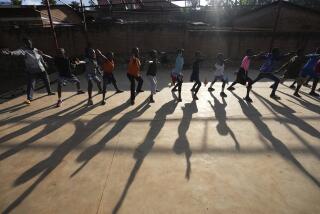Editorial: How to cut militias off from gold and mineral mines in Congo
Few parts of the world have been more ravaged by war and violence over the last two decades than the Democratic Republic of Congo. That’s been made possible, in part, by the mines in the eastern part of the country that offer up tin, tungsten and tantalum — the 3Ts, as they’re known — and gold. Over the years, many of the mines have been commandeered or controlled by armed militias and the profits used to fund the continued violence.
But recently, human rights groups have successfully pressured makers of consumer electronics and electronic parts, which rely on the 3Ts, to track the source of their minerals and refuse to buy from suppliers who buy from mines that help fund armed rebels. A provision in the Dodd-Frank Act, passed in 2010, requires publicly traded companies to disclose if they have products containing minerals from Congo and what steps were taken to ascertain whether the ore came from tainted mines.
Together, these changes have dramatically shrunk the market for untraceable 3T conflict minerals, affecting prices and disrupting the supply chain. As a result, about 67% of tin, tantalum and tungsten mines in Congo are no longer in the control of armed militias, according to the Enough Project, a human rights group.
But demilitarizing the gold mines remains a challenge. Only a small fraction of the mined world’s gold comes from Congo — about 1%. But 98% of the artisanally mined gold in Congo is smuggled out of the country and much of that benefits armed groups, according to the United Nations Group of Experts on the Democratic Republic of Congo. Smugglers take it to Uganda and Burundi and then to Dubai. From there, the gold enters a global supply chain where much of it is sold as jewelry.
Armed groups generally are present at the gold mining sites. They’re either confiscating miners’ gold at gunpoint, or forcing miners to pay them bribes to let them keep mining. An assortment of nefarious rebel groups — and corrupt Congolese army commanders — profit off the mines these days. These include the FDLR (the genocidal Democratic Forces for the Liberation of Rwanda, which has been operating in Congo for years), the loosely organized armed group known as Raia Mutomboki, and Mai Mai Sheka , a militia group run by Ntabo Ntaberi Sheka, who is wanted for mass rape. All three groups have a history of contributing to the violence in Congo that has left millions dead and made the rape of women, girls, some men and boys an epidemic, according to Human Rights Watch.
In response, the World Gold Council has started a gold industry audit. And Congo and other governments in the Great Lakes area of Africa are working on a conflict-free certification process for mines and exporters. But it’s moving slowly.
Pressure must be put on large jewelry retailers to help dry up the gold supply to armed groups. They should not just be auditing the sources of their gold — as Dodd-Frank requires publicly traded companies to do — but they should also refuse to buy from suppliers found to be providing conflict minerals. And retailers should be aggressive about making sure their suppliers are tracking the origins of their gold and even helping their suppliers do so.
Some critics say that such measures end up hurting the miners more than the rebels because the miners end up out of work. In fact, jewelry retailers can support a variety of international aid projects underway — one is run by USAID — to demilitarize these mines, encourage new investment and put miners to work. Ideally, retailers should not abandon Congo but work with suppliers to get mines out of conflict.
Consumers of gold jewelry can play a part as well, demanding that retailers publicly declare whether they are selling gold that may be of tainted origin, and by refusing to buy from those stores if it appears that the product is from conflict gold or if the store can’t identify the source of the gold. Some large jewelry retailers have already made aggressive efforts, including Tiffany & Co. and Signet Jewelers, according to the Enough Project, which released a survey of large North American retailers. But they all need to be involved if these efforts to weaken some of the most egregious perpetrators of human rights violations in the world are to be successful.
Follow the Opinion section on Twitter @latimesopinion
More to Read
A cure for the common opinion
Get thought-provoking perspectives with our weekly newsletter.
You may occasionally receive promotional content from the Los Angeles Times.






